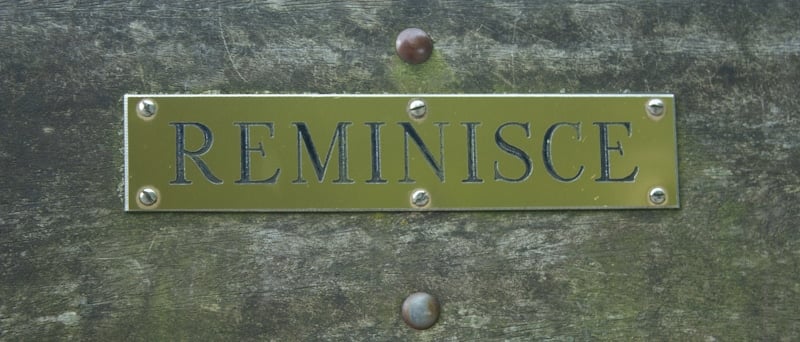If you are a fan of transitive verbs and words that summarize the meaning of feelings properly from a previous time, you need to know about the word “reminiscing” and learn how to use it in a sentence.
We normally use the word reminiscing when referring to an event or situation of the past that came to our mind in the present. The correct way to use it is in a sentence where you refer to a past event that comes to your thoughts in the current time and causes emotion.
Where does the word “reminiscing” come from?
More often than not, a lot of the words we use have their origin in Latin; reminiscing is not the exception. If we break down the word in its parts, we have the Latin word for “mind” that is “mens” and added to that the prefix re-. By putting these together, the verb “reminisi” was created. This verb means “to remember,” but there is more to it than just remembering. Also, reminiscing is the conjugated form of the root of the word reminisce in English.
The fact that the prefix re- was used changes the meaning into something profound, deepening the meaning of the word and involving imagery. So, reminisce or reminiscing essentially means to bring an image from the past to our mind, in a very literal way, in a way that we feel nostalgia and longing.
This is why reminiscing is a rather distinguished word used on a special occasion when we think of something memorable to us, and we do so fondly.
To reminisce or reminiscing is something we indulge in. When we remember is more connected to facts about memories, reminiscing means more to connect and live back that moment by allowing not only the memory to arise but also the feelings of that moment.

Reminiscing is a transitive verb
Think of transitive verbs as verbs that need a buddy for you to use them. So, when we use “to reminisce” or “reminiscing” in a sentence, we need an object to connect that to. An object is usually the “who” or “whom” in a sentence. That is why we reminisce about a place, a time, a person, an event, a memory. These all act as the object, the buddy, so reminiscing can be used correctly.
Intransitive verbs are the independent ones in the family of verbs, the lone sheep. While to reminisce we need an object to reminisce about.
Remember is another transitive verb that means something very similar to reminiscing, read below, and you’ll see what I mean.
Do I use remembering or reminiscing and when?
If you think that remembering and reminiscing are practically the same in meaning and use, you are not correct, but you are not wrong either. I will explain why.
When we remember, we are bringing back or recalling a memory; however, the memory does not necessarily emotionally connect to us. So, we remember without fondness and longing. Remembering is usually more connected to facts of people, dates, and events.
We can also remember information like if you are a lawyer, you know about the constitution and you have memorized terminology related to your career. Doctors in medicine also need to remember a lot of information often to do their jobs successfully, especially when diagnosing a patient.
So, when remembering, we are more objective. What we remember brings an image to us, something in our brain that connects to the information we need, but it is not usually connected emotionally. When we are reminiscing, we are emotionally affected by the memory we bring back; there is nostalgia and a want connected to that memory.
Reminiscing is also of personal meaning. It is not the same experience for me to think of the sunset of a particular day as it is to another person. The difference in what the memory represents and makes you feel will determine whether you are just remembering it or reminiscing about it.

How do we use “reminiscing” in a sentence?
We have learned what the word means, where it comes from, the different forms one can reminisce. The correct way to use reminiscing or reminisce is when we are referring to a memory that washes over us, a memory that brings feelings, usually as strong as the day we first felt them.
Now, let’s see some examples of how we can use reminiscing in a sentence:
- I found an old photo from my school days, and reminiscing took over me.
- Reminiscing of times together is a bittersweet memory. Time before I had to abjure his friendship.
- It has been years since we last visited them, but I still find myself reminiscing.
- High school reunions are all about reminiscing, living again.
- When I see children play, I often do reminiscing of better days when I was a child.
- Now that he is retired, he is constantly reminiscing about the times in the office.
- Hoarders use reminiscing as an excuse to accumulate more and never dispose of anything.
- Every time the family gathers, looking at old photos and reminiscing is inevitable.
- The death of her father brought on reminiscing of when her mother had passed.
- Reminiscing about an old love often brings the pain of the loss to the present.
- I went to The Computer Museum, and reminiscing took over me as I saw the big screens and the floppy disks.
- Visiting my home town hits the same every time. I can’t stop reminiscing about my youth and everything that happened there growing up.
- She often found her parents reminiscing of the old days.
- My mother always said reminiscing about the old days is living again.
- Some streets travelers walk have no connection to their past, but the history that lives in them makes it impossible to refrain from reminiscing.
So if you are to use “reminiscing,” keep in mind that because of the meaning of the word, use it only if you mean it. Otherwise, you can use remember, which is more about the act of evoking a memory or fact we have learned, also bringing back an image from a past event where feelings are not usually involved.
Should we be reminiscing?
I think we have all taken a stroll down memory lane, either a place, a smell, a date, or a person has brought us back to that moment. Generally, reminiscing is harmless, and honestly, it is only human to do so.
We are caught up reliving moments, experiences, places that we have visited, or create memories in. So, reminiscing is good, but there can also be a downside to it. If the way we reminisce is obsessive, used in an escapist way or instrumentally, it could turn an experience and memory into something else entirely.
Obsessive reminiscing
If you fall into this form of reminiscing, you will be a person who is fixated on the past, usually obsessed negatively in events that are long gone, but you allow it to come back to your life more often than you should. These memories bring you pain and make you feel down.
If you have caught yourself going back and reminiscing on the same memory, about the same place, person or event, and finding yourself feeling bummed out every time, then you are not reminiscing properly. You might need some reframing or to restructure your thinking about that memory.
Escapist reminiscing
On the other hand, escapist reminiscence is completely the opposite of obsessive. You would only focus on the good, the beautiful memories, how wonderful everything was. What this means is you would “escape” your current reality and replace it for a moment with a reality that you think of fondly, a place, time or people that made you very happy.
Why shouldn’t you? I think it is important to connect and embrace our current state, the place we are in, the people we are with. Otherwise, you miss out on making new memories, probably more memorable than those you keep going back to.
Instrumental reminiscing
I think this one is the lesser evil when used correctly. Just like a loaded gun in the wrong hands, instrumental reminiscing can be used as a building tool for personal, emotional growth, even career advancement.
You can use instrumental reminiscing to take the bad, learn from it, and grow from there. Or taking the good and building upon what has worked for you before.

Who would have thought there was more to reminiscing than just using the word in a sentence?
I think often reminiscing crosses over to remembering and vice-versa. Sometimes we can not tell the difference because there is usually some form of sentiment associated with recalling the past. If we are just recalling information is likely we focus on the facts exclusively, but if we think of people, places, and events, remembering might not measure up to what goes on in our minds. That is why the word “reminiscing” is more fitting.
If you are telling a story of something you have lived, or a person that you met, or a place you visited and you do it in a reminiscing way, there is more magic to the story. You can transport others to those times, and you can pass on your feelings of the moment more efficiently.
Now, when you use the word “reminiscing,” you will do it with purpose and intention, and if you ever are to reminisce yourself, you will do it properly and know exactly how deeply to thread.
Shawn Manaher is the founder and CEO of The Content Authority. He’s one part content manager, one part writing ninja organizer, and two parts leader of top content creators. You don’t even want to know what he calls pancakes.

